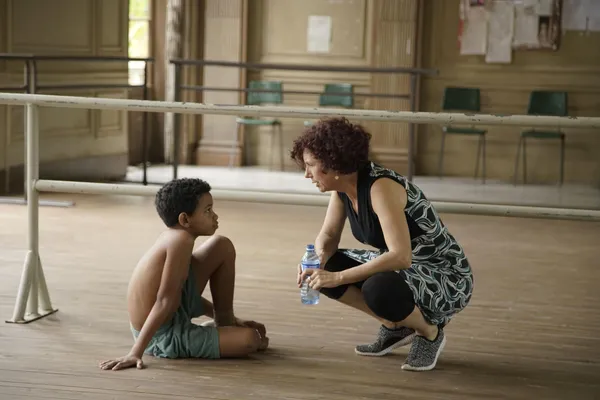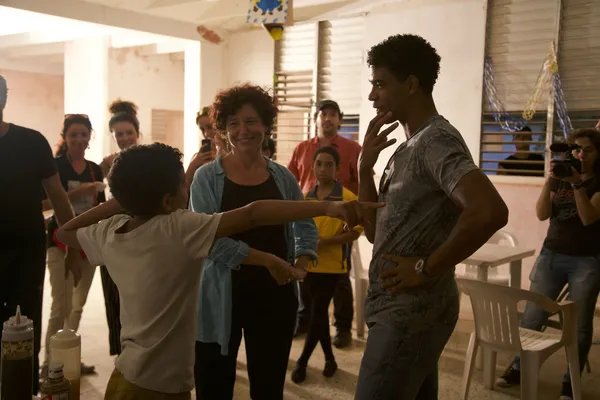 |
| Icíar Bollaín on the set of Yuli: 'We say that the dance tells some parts of his life, but actually the dance tells the emotions of his life' Photo: Courtesy of San Sebastian Film Festival |
Carlos Acosta biopic Yuli - adapted from his biography by Scottish writer Paul Laverty and directed by Spaniard Icíar Bollaín had its UK premiere at Glasgow Film Festival this week. More traditional biographical storytelling is mixed with dance to bring the emotion of Acosta's memories (played by himself, and in younger years by Edlison Manuel Olbera Núñez and Keyvin Martínez) to the fore. The film charts his reluctance to become a ballet dancer, despite being pushed by his father (Santiago Alfonso), with whom he had a difficult relationship, and his tutor Chery (Laura De la Uz), until his final embrace of the craft and rise to international fame. The film had its world premiere at San Sebastian Festival last September, where I caught up with Bollaín and Laverty to talk about it.
Amber Wilkinson: I was really interested in the way you incorporated the dance into the more traditional biopic that people recognised.
Icíar Bollaín: That was the idea from the start, to break the conventional biography. Paul can tell you because it was in the script before the direction.
Paul Laverty: It is very hard to do a biopic that's not just a series of sequences - and then, and then... during a long life. We went to Cuba and we saw them rehearse and the great trick in a biopic is to try to find some framing device, which you can go to at key moments in their life. And we thought, 'Well we've got these brilliant dancers, Carlos is an amazing dancer coming towards the end of his career, so why not dance some of it?' But it's quite easy to give hints about what a dance might be like in a script, but that's when Iciar had to do really complicated work, with the choreographer and then the dancers and then to film it. It was much easier in the script.
AW:It was dovetailing so tightly. To take a specific scene, when he's getting beaten by his dad, you're using the dancing section against the piece from the past. Does that happen just in the edit or are you thinking about that all the time?
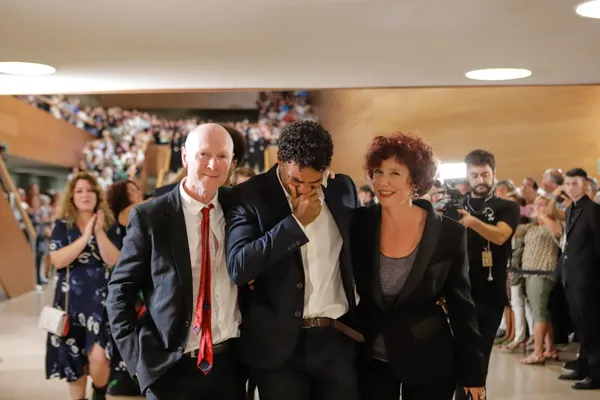 |
| Paul Laverty, Carlos Acosta and Iciar Bollain Photo: Courtesy of San Sebastian Film Festival/Jorge Fuembuena |
IB: To use the sound overlapping the dance was actually in the editing. In the script, the idea was that we see what happens inside the room in the dance and we are only seeing what happens outside of the room. So, every time we go into the room, it's the dance. Then the choreographer came and did a dance, which was a beating dance, and then we shot it and then in the editing we start playing and saying how much of the dance we see and then overlapping the sound and all of that was the process of finding the language of the scene.
AW: The film is more about his emotional journey than going through the plot points of his life.
IB: We say that the dance tells some parts of his life, but actually the dance tells the emotions of his life. It's the beating, it's the lost moment, then we see loneliness and then we see the sex and lights of the fame later on, so it's very much about feelings.
AW: When you came to work with the book - because normally you collaborate just between yourselves - is that different? Are you concerned to be taking somebody's real life and do this?
PL: I've never done an adaption before, so it wasn't a master plan. I'd never really intended to do that. It just coincided with space we had and with Iciar. We had talked about doing another project together and then this came at the right time, because Andrea Calderwood is an old friend, and I was asked earlier on to try to do something but it just didn't work out. We came to this and weren't very sure about it because I wasn't sure I could find a way into it. I don't know very much about dance, so we decided we would go to Cuba and see if we could find a way into it. Carlos is very warm. We read the book and there are some lovely moments in it and the childhood interested us a great deal. You could have told his life in the States or in England and many other parts but we just thought the childhood was key and the relationship with the father was key. Even when you do an adaption, there's still an enormous amount you just have to imagine.
AW: It was interesting that at the press conference yesterday, Carlos was saying that returning to it as a film was still quite traumatic for him. I wondered how that is from your perspective, because you know you're dealing with somebody who maybe has had a slightly traumatic element to their childhood. Does that change the way you approach it?
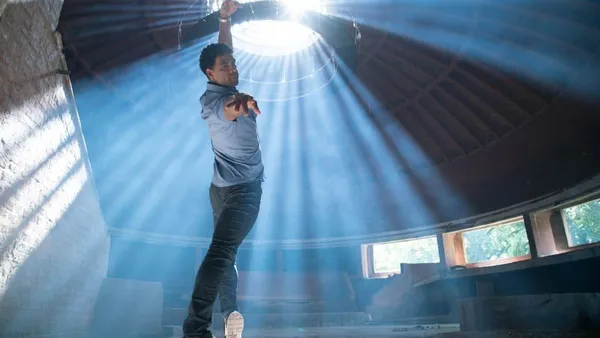 |
| Carlos Acosta in Yuli. Paul Laverty: 'You have to follow your own instinct but I think Carlos trusted us and took it on with us' Photo: Courtesy of San Sebastian Film Festival |
PL: You're aware that there's a human being there and that it's his life. So, first of all, you have to have respect for that and not assume things. You have to follow your own instinct but I think Carlos trusted us and took it on with us. He didn't interfere at all. When we gave him the first draft of the script, we had no idea what he was going to think but he was super-positive. He was just amazed we 'got' these things about his life. I think they are painful things to talk about but you could sense that from the book and from some of the family members we talked to - we saw his family members in Cuba.
AW: So you were able to fill in the gaps between the book and the man?
PL: There's about a 15-year difference. When he wrote the book, his father was still alive, I think. So, all of that which is his past, was true, but also fictional, about going to the slave plantation, that was all invented, but at the same time, it was probably very true because his grandmother was born to slaves. He was very happy with that because that was part of his father's story.
AW: And, in a way, you point to the fictions in the persons life as well. He says at once point, 'I'm making this up... but it's true'. I think that will strike a chord with a lot of people because what is memory, if not a slight blend of the thing that happened and the way that you emotionally feel about that.
PL: Also, it's a biopic. They're not really biopics, it's just one version of events. There's all these different characters and there's 1000 different narratives. I'm sure you could give one version of your life to one person and then give another version to someone else and it would be true and contradictory.
AW: Also, I feel as though the way you both like to work together is that you like to incorporate quite a bit of social backdrop. I feel like in your films it's important for the social fabric to be evident, like with this or The Olive Tree, even though they're family stories. Is that something that is important?
PL: For me it's absolutely critical. I hate films where you just see people in an abstraction. If you've no sense of how they live, then you don't understand the choices they make, so it's very anti-dramatic. But if you see the limitations of people and see the choices they make, that's what makes it interesting. The choices that Carlos made, were massive. It wasn't just, 'Am I going to go back to Cuba? Am I going to London?' He was fearful that Chery would lose her job and he was fearful that he wouldn't be allowed back to see his family, he was fearful that he would never dance again.
So these are massive choices... and if you don't understand Cuba. And you can't understand Cuba without understanding the United States - it's like this giant shadow crossing the country. If you can't understand Cuba too, you don't realise that for so many young people there, there was no possibility of work and they wanted to leave - he wanted to go back. So if you don't have that, you don't see the interesting choices Carlos makes in his personal life - the political, the familiar, just the reality of Cuba actually impinges on the characters in the story. If those don't work, it's just an empty shell. It's enriched and entwined.
AW: You've got Carlos at every age, from eight or nine on upwards, how was it to cast that?
IB: First of all, for the script we had to make the decision of how many Carloses we were going to see. That was a big decision because the kid starts at nine but, for example, when he is in boarding school, he's actually 13 and then in Lausanne, when he wins, he's 16 and then when he comes to London, he's 18 - so how many Carloses can we have? We actually simplified the first 40 minutes in the nine or 10 year old - the casting was very long because we had to find someone with his spirit and Carlos was a very spirited kid. There was something very special about him. Everybody said, 'This kid was special so you have to find a special kid.' And then we did.
Then Keyvin - we didn't have much choice because for the character of 20 years old we needed a dancer. That was the other thing of the film - dancers are going to dance. We're not going to cut, we're not going to go back, we're not going to fake it, he needs to dance. The young boy, we taught him the basics and sometimes there's another boy who dances - he wasn't a dancer, he liked football like Carlos. He was learning, but he had very little dance and a lot of acting, so I went for the actor there. Then I did the opposite with the dancer - I needed a dancer who could act.
The choices weren't that many because there are not that many black dancers or Mulatto dancers, so I had to choose. So I think there's something in common between Carlos and Keyvin. Keyvin comes from the same neighbourhood as Carlos, he had a tough childhood too and I think there was a spirit in them that's kind of similar. The father was also very difficult to cast because there are very few black actors in Cuba, like everywhere else, so even being such a mixed cultural, multiracial place, there are very few black actors. So, again I had few choices. Santiago Alfonso, who plays the father has done some work as an actor but mainly he's a choreographer - he's fantastic, he was the choreographer for 20 years at the Tropicana [night club]. So he's an institution. He actually was one of Carlos' teachers and he threw him out of his class because he was impossible. But we were very lucky because he didn't have much experience of acting but he had lots of weight and charisma and we needed that for the part.
AW: The fact that you're talking about 'fictions' helps with the fact that there are multiple actors playing the role, because you just go with it as incarnations of Carlos. You don't have to think they look absolutely the same.
IB: That was another decision. It's hard enough to have a dancer who can act, but I think the audiences take it. Keyvin is very different from Carlos but somehow there is something in common and you just go with it.
PL: I think you have to go for the spirit of it - and the wee boy is almost a double of the small Carlos. You don't have to be literal all the time and you have to find someone who is a great dancer and you believe them in that role.
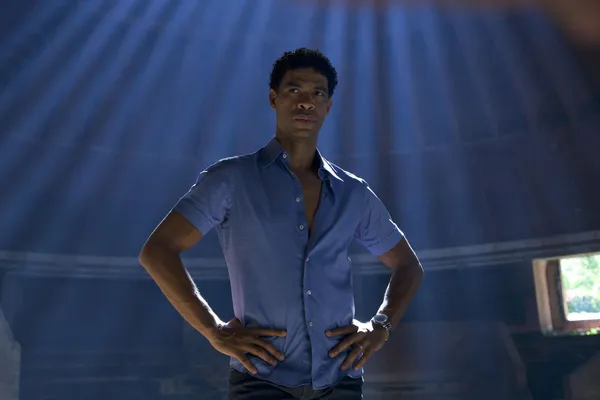 |
| Paul Laverty on making Yuli with Acosta, above: 'You only get a shot at a few films, so you might as well do something that's interesting to yourselves' Photo: Courtesy of San Sebastian Film Festival |
IC: And the footage of him getting the award in Lausanne is real and the footage of Romeo and Juliet. They were an amazing couple. She was a Spanish dancer, who is now running the English Ballet, I think, Tamara Rojo - they made an explosive couple. On paper, we were thinking, 'Is this going to work? Is this going to match together - the kid, the dancer, Carlos, the footage' There were lots of elements.
AW: This feels like a big film for you, with lots of countries and elements. Do you feel that because you're continually working together you get braver as your collaboration goes on?
PL: I think Even The Rain was even bigger. That was the biggest gamble of the lot and I think Iciar was very brave to take that on. In less skilful hands that could have been a laughable disaster. But you only get a shot at a few films, so you might as well do something that's interesting to yourselves. It's been great working with Iciar on this but also to try to tell a story through dance and music and image.
AW: It must have been nice to have a new challenge?
PL: Every new story, you're not repeating yourself. To do a story in Spanish to try to understand Cuban culture and engage with Cuban history and to realise that there were a million slaves brought over and that has massively affected the entire islands. It's affected the life and personalities and to learn about the African gods and Cuban history - it's a massive challenge when it's not your own culture but it's also incredibly fascinating. What's very satisfying is that the Cubans we've met feel it's very true to their experience and their country. If it didn't ring true to them, I think we'd have been very disappointed.
Yuli - The Carlos Acosta Story will be part of a live event at the Royal Albert Hall on April 3 which is being cinecast to audiences around the UK. For more details visit acostafilm.com. It goes on general release in the UK on March 29








